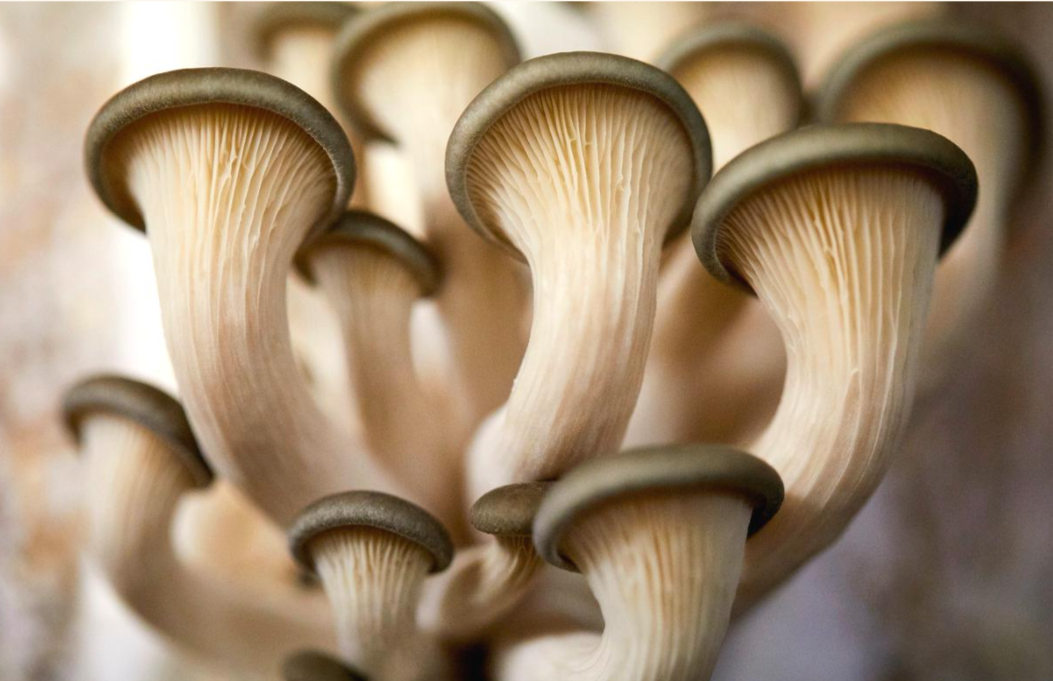




Keep this story going! Share below!
The PermaFungi project is about the cultivation of oyster mushrooms from recycled coffee grounds.
The oyster mushrooms are grown locally in the cellars of Tour & Taxis on recycled coffee grounds which guaranteed fresh and certified organic by Certisys. The coffee grounds are first collected by bike from Brussels restaurants and when they arrived at the workshop, coffee grounds are mixed with straw and mycelium (the mushroom seed), but some undesirable microorganisms can grow on coffee grounds too, so this process must be done in a sterile environment. After that comes the incubation part, bags filled with the mixture are placed in an incubation room for an approximate period of 2 weeks. In this phase, the mycelium is going to colonize and decompose the substrate. In this phase, the black bags filled with the mixture slowly turn white as the second phase goes on. In order to get them ready to harvest in few days after the incubation phase, the bags, which are white now, will be put in a room exposed to the shock of lamps, freshness, and humidity.
In addition to the cultivation of oyster mushrooms, PermaFungi has developed several other (circular) activities.
PermaFungi broadened their innovative idea to several other activities. The wastes of the production procedure are given to a local farm as fertilizer. By using bikes to collect coffee grounds from restaurants and to distribute the fresh oyster mushrooms, they can avoid CO2 emissions. Moreover PermaFungi organizes workshops to inspire people to start their own oyster mushroom cultivation and to get participants to have a good understanding of the concept of urban resilience. PermaFungi also sells ready-to-use kits for home customers, FungiPop, so that customers can recycle their coffee grounds and grow oyster mushroom themselves in 10 days time at home.

The idea for the project stems from observations of the co-founders, Martin Germeau and Martin François. Germeau performed training as a volunteer at a permaculture project in Thailand, where he was inspired to start his own business in Brussels. Permafungi could use coffee grounds to do many things, not only to grow mushrooms, but with this inspiration they started to recycle coffee grounds. Moreover, the co-founders observed the abundance of an urban waste stream and the relatively high unemployment among young people. Based on these observations a study was started in 2013 to reuse coffee grit as a breeding ground for oyster mushrooms, while at the same time creating a stable and sustainable workplace for young people in Brussels. After a trial phase in the cellars of Ateliers des Tanneurs in 2014, PermaFungi moved their workshop to the cellars of Tour & Taxis.
PermaFungi has two main activities:
1) Production of mushrooms for consumption. Permafungi cultivates organic oyster mushrooms without pesticides and based on local raw materials. All of this hard work is achieved with zero waste by using their production waste as fertilizer for agriculture. Moreover they avoid CO2 emissions by using bikes as their main transportation system.
2) Production of cultivation kits for families to grow their own mushrooms at home - the ready-to-use grow kits FungiPop. These kits have a dual function: to increase awareness of urban agriculture and to teach people to produce their own food in a fun and funny way.
“Before, we also had developed chicory production and mushroom material; however, we stopped this project now,” said the company’s communication and marketing officer.
Social impact:
PermaFungi provides the opportunity for a valuable and sustainable job, especially to young people with a low educational level; from 2014 to 2017, PermaFungi created 12 jobs. PermaFungi also regularly introduces curious people to the project and its objectives through guided tours, workshops and training. The purpose of this is to encourage others to produce mushrooms, or myco material in a circular manner.
Environmental impact:
From 2014 to 2017 PermaFungi collected 61T of coffee grounds by bicycle, and produced 14T of oyster mushrooms and 140T of natural fertilizer. Also, in addition to eatable mushrooms, Permafungi produces completely artisanal, organic and biodegradable lampshades, based on Permafungi’s waste stream from the oyster mushroom production. By adding mycelium to the residual, compost is transformed into a sustainable material from which lampshades are made.
On the one hand, this increases the circularity of PermaFungi's production, and on the other hand, it creates high value-added products which are an alternative to plastic.
Get stories of positive business innovations from around the world delivered right to your inbox.
Elena Putiatina, Communication Officer

PermaFungi contributes to urban resilience of cities by reconsidering coffee ground wastes as an ideal growing medium for oyster mushrooms. By recycling coffee grounds, Permafungi values waste that is usually thrown in the trash. Furthermore, the company uses bikes for collecting all the coffee waste from the city to prevent CO2 emissions and it organizes visits in the company for interested people to raise social awareness. All these activities are aligned with the Sustainable Development Goals. Moreover, Permafungi demonstrates the 4Ps of sustainable development: social impact “People”, environmental impact “Planet”, economic sustainability “Prosperity” and “Participatory governance”.